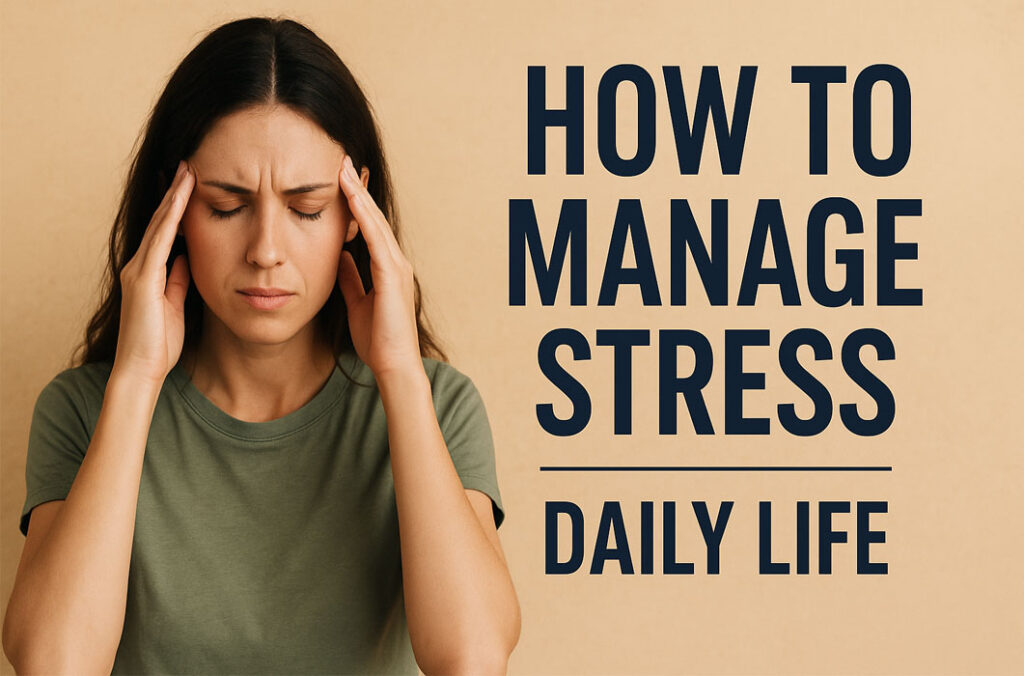Stress is a part of everyday life, but letting it control you doesn’t have to be. Learning how to manage stress daily life is about balance, not perfection. With a few small shifts in your routine like mindful breathing, better sleep habits, and simple mindset changes, you can feel calmer, think clearer, and handle challenges with more ease every single day.
What is Stress, and Why Manage Stress Daily Matters
Stress is the body’s natural response to challenges — a built-in alarm system that helps you react and adapt. In daily life, a little bit of stress can actually be useful. It pushes you to meet deadlines, stay alert in traffic, or perform better in important moments. But when stress becomes constant, it starts working against you instead of for you. That’s why understanding what daily life stress really means is the first step toward managing it effectively.
The Science Behind Stress: Fight or Flight Made Simple
When you face something stressful, a sudden email from your boss, traffic jams, or even a tense conversation, your body activates the fight-or-flight response. The brain releases hormones like cortisol and adrenaline, which raise your heart rate, tighten your muscles, and sharpen your focus. This short burst of energy is designed to help you survive a threat.
According to the Mayo Clinic, short-term or acute stress usually fades once the situation ends. But if your body stays in this alert mode for too long, like being stuck in constant deadlines or emotional strain, it turns into chronic stress. Over time, this state quietly wears you down.
The Hidden Costs of Chronic Stress
Living with ongoing stress affects almost every system in your body. The Mayo Clinic notes that it can lead to headaches, insomnia, anxiety, high blood pressure, and weakened immunity. Mentally, it clouds focus and decision-making, making even small tasks feel heavier. Chronic stress also interferes with sleep cycles and appetite, leaving you drained and more reactive the next day.
Left unmanaged, this cycle can make everyday life feel overwhelming even when nothing major is wrong. That’s why learning to handle stress as it happens, not just after burnout hits, is so important. Small daily habits can make a big difference in how you think, feel, and recover from life’s constant pressures.
The 5 Daily Pillars: How to Manage Stress Daily
When it comes to staying calm and balanced, consistency matters more than perfection. Experts at Harvard Health note that managing stress isn’t about one big change — it’s about building small, steady habits that support your mind and body every day. These five daily stress management pillars create the foundation for a healthier, more focused life.
1. Sleep — Protect Your Recharge Time
Set a steady bedtime and wake-up schedule, aiming for at least 7 hours of sleep. Rest is how your body repairs, regulates hormones, and resets your emotional balance.
2. Movement — Move a Little, Often
You don’t need a full gym session. Even 15–20 minutes of walking, stretching, or light exercise can calm your nerves and lower cortisol levels.
3. Mindfulness & Relaxation — Pause to Reset
Take short breaks for deep breathing, meditation, or mindful pauses during the day. Just 5 minutes of quiet can shift your focus and relax your body’s stress response.
4. Nutrition — Eat for Steady Energy
Choose whole foods, fiber, and hydration over sugar or caffeine overload. A balanced diet keeps your mood and energy levels stable throughout the day.
5. Social & Boundaries — Stay Connected, Stay Grounded
Talk to someone you trust, share how you feel, and set limits where needed. Healthy boundaries prevent burnout and remind you that you don’t have to face everything alone.
Together, these simple habits help you build resilience so even on tough days, you bounce back faster and feel more in control.

Pillar 1: Build a Realistic Sleep and Recovery Routine
Good sleep isn’t a luxury — it’s one of the strongest shields against daily stress. According to Harvard Health and the Mayo Clinic, a consistent sleep routine helps regulate your mood, sharpen focus, and reduce the release of stress hormones like cortisol. When you don’t sleep well, your body stays in a mild “alert” mode, making you more reactive to even small frustrations. Over time, that constant tension drains both mental and physical energy.
Why Sleep Matters for Stress Resilience
Think of sleep as your nightly reset button. During deep sleep, your heart rate slows, muscles relax, and your brain clears out waste proteins linked to stress and anxiety. Without enough rest, your body doesn’t fully recover — your patience shortens, emotions heighten, and simple tasks start to feel harder than they should. Getting 7 to 8 hours of quality sleep each night is one of the easiest, most natural ways to sleep to reduce stress daily and keep your emotional balance steady.
Simple Steps for Better Sleep
- Set a fixed wake-up time: Try to wake up and go to bed at the same time every day — even on weekends.
- Create a wind-down ritual: Read, stretch, or listen to calm music 30–60 minutes before bed.
- Cut screens before sleep: Avoid phones and bright screens at least an hour before bedtime to help your brain slow down.
- Use short naps wisely: A 20-minute nap in the early afternoon can recharge energy, but longer naps can make you groggy.
- Keep your room cool and dark: A quiet, dark space signals your body it’s time to rest.
A few consistent choices like these can completely change how rested — and calm — you feel the next day. Sleep is your most natural stress reliever; treat it as the foundation of your recovery routine.
Pillar 2: Movement and Breathing — Short Practices That Reset Your Nervous System
When life feels heavy or your thoughts start racing, your body often tells the story before your mind catches up – tight shoulders, shallow breathing, clenched jaw. That’s your nervous system asking for a reset. According to Harvard Health and Verywell Mind, even a few minutes of mindful movement or slow, deep breathing can calm your body’s stress response almost instantly. These small actions send a message to your brain that you are safe, slowing the release of cortisol and restoring a sense of control.
The Power of Breathing and Grounding
Deep or diaphragmatic breathing works by activating the body’s relaxation response. Here’s how to try it:
- Sit comfortably, shoulders relaxed.
- Inhale slowly through your nose for 4 counts, letting your belly rise.
- Hold the breath gently for 2 counts.
- Exhale through your mouth for 6 counts, feeling your body soften.
Repeat for one minute, notice the difference.
You can also use quick techniques like the 3-3-3 rule (name 3 things you see, 3 things you hear, 3 parts of your body you can move) or the 5-4-3-2-1 grounding method (identify sensory details around you) to pull yourself back into the present moment within 60–90 seconds. Both are powerful, evidence-based ways to reduce anxiety and refocus your mind.
Micro-Movement: Stress Relief in Motion
Not every stress fix needs a gym session. Verywell Mind recommends short bursts of movement throughout the day, 5–15 minutes of walking, desk stretches, or simple mobility drills. These “micro-workouts” improve blood flow, loosen tense muscles, and help clear mental fog. Even standing up every hour to stretch your arms or roll your shoulders can reset your mood and boost focus.
Movement and breathing may seem small, but practiced daily, they act like an internal reset button – restoring calm, improving energy, and helping you handle life’s ups and downs with a steadier mind.
Pillar 3: Mental Habits — Reframe, Plan, and Limit Worry
The way you think about stress can either add to it or help you manage it. Building better mental habits isn’t about “staying positive all the time” – it’s about learning to guide your thoughts instead of letting them run wild. According to HelpGuide.org, simple mindset shifts like reframing problems, setting limits on worry, and celebrating small wins can dramatically lower daily stress levels.
Cognitive Reframing and the “Worry Window” Technique
When something goes wrong, it’s easy to slip into “worst-case” thinking. Cognitive reframing helps you step back and look at situations differently. Instead of thinking, “I’ll never finish this project,” try, “This is tough, but I can handle one step at a time.” This small shift reduces the emotional weight of problems and helps your brain focus on action, not panic.
Another useful tool is the “worry window.” Schedule a short 10–15 minute block in your day – say, at 6 p.m., just for worrying. During that time, jot down what’s bothering you and possible next steps. Outside that window, if worries pop up, remind yourself they can wait. This technique, supported by HelpGuide.org, stops endless rumination and gives your mind permission to rest.
Action-Focused Steps: Work Smarter, Not Harder
The NHS suggests breaking big, overwhelming tasks into 15-minute chunks. When you focus on one small piece at a time, you build momentum and reduce mental clutter. Progress, no matter how small, brings a sense of control, one of the best antidotes to stress.
Gratitude and Micro-Wins: End Your Day on a Lighter Note
Before bed, note three small wins from your day – a finished email, a kind message, or even showing up on time. The NHS highlights this “3 wins” exercise as a simple way to train your mind to notice progress, not just pressure. Over time, this habit rewires your focus from what’s wrong to what’s working — a core part of mental stress management daily.
Together, these small mental habits help you stay grounded, think clearer, and build emotional resilience – even on difficult days.
Pillar 4: Nutrition & Substances — What to Eat, Avoid, and Timing
What you eat can either fuel your resilience or feed your stress. According to Verywell Mind, certain foods actively support your body’s ability to handle daily pressure. Omega-3-rich foods like salmon or walnuts help regulate mood. Leafy greens and whole grains stabilize blood sugar and provide steady energy, while nuts and seeds offer healthy fats that support brain function. Eating these regularly creates a foundation for calm and focus.
At the same time, some substances can make stress worse. Mayo Clinic warns that too much caffeine, alcohol, or sugar can trigger spikes in stress hormones or disrupt sleep. Practical swaps – like herbal teas instead of coffee late in the day, sparkling water instead of soda, or fruit instead of candy – can keep energy steady and your mind calmer. Timing matters too: heavy meals late at night can affect sleep, while small, balanced meals throughout the day help maintain even energy levels.
Sample Day for Steady Energy and Stress Reduction
- Breakfast: Oatmeal with berries and walnuts
- Snack: Greek yogurt with a handful of almonds
- Lunch: Quinoa salad with leafy greens, chickpeas, and olive oil
- Snack: Apple slices with peanut butter
- Dinner: Grilled salmon with steamed vegetables and brown rice
By choosing foods that stabilize mood and energy while limiting stress triggers, you can make a tangible difference in how you feel every day. A mindful approach to eating is one of the easiest and most effective ways to food to reduce stress daily.
Pillar 5: Social Support, Boundaries, and Asking for Help
Humans are social creatures, and our connections play a vital role in managing stress. According to the American Psychological Association, meaningful social support – friends, family, or colleagues you trust acts as a buffer against daily pressures. Simply sharing your thoughts or venting a little can reduce stress hormone levels and improve emotional resilience.
Setting Small Boundaries
While support is important, overcommitting can increase stress. Start with small boundaries: limit checking emails to set times, say no politely when your plate is full, and communicate your availability clearly. These small adjustments protect your energy without isolating you, creating a healthy balance between giving and preserving yourself.
When to Seek Professional Help
Sometimes stress goes beyond daily pressure, and professional support becomes necessary. The NHS recommends seeking help if you notice persistent anxiety, trouble sleeping, mood swings, or difficulty functioning at work or home. A therapist, counselor, or mental health professional can provide guidance, coping tools, and support tailored to your situation.
Building a network of support, practicing healthy boundaries, and knowing when to reach out are essential parts of social support for stress daily. With these habits in place, you not only reduce immediate tension but also create a sustainable foundation for long-term emotional well-being.
Quick Fixes & On-the-Spot Tools
Sometimes stress hits suddenly, and you need a fast reset. According to Verywell Health and Harvard Health, simple, short techniques can calm your nervous system almost instantly. Here are some easy tools you can use anywhere:
- 60-Second Breath: Take one minute of slow, deep breaths, inhale for 4, hold 2, exhale 6.
- Cold Splash to Face: A quick splash of cold water can reset your body’s stress response.
- 3-3-3 Rule: Name 3 things you see, 3 things you hear, and 3 parts of your body you can move to ground yourself.
- 2-Minute Walk: A brief walk clears your mind and releases tension.
- Mini-Stretch: Roll shoulders, stretch arms, or touch your toes for 1–2 minutes.
- Sensory Grounding: Focus on sights, sounds, textures, or smells around you to bring your attention back to the present.
These small, practical actions can provide quick stress relief daily, helping you regain focus and calm even in the busiest moments.

FAQs: Stress Management FAQ
1. What is the fastest way to calm stress right now?
A quick reset can be as simple as deep breathing for one minute. Inhale slowly, hold briefly, and exhale fully. This helps slow the heart rate and signals your body to relax (Harvard Health).
2. How much exercise helps reduce daily stress?
Even 15–30 minutes of moderate activity like walking, stretching, or yoga can lower stress hormones and improve mood. Consistency matters more than intensity (Verywell Health).
3. Can food really affect stress?
Yes. Foods rich in omega-3s, leafy greens, whole grains, and nuts support brain and mood health, while excess caffeine, sugar, and alcohol can increase stress responses (Harvard Health).
4. When should I see a therapist for stress?
Seek professional help if stress is persistent, disrupts sleep, affects relationships, or causes anxiety or depression. Therapists provide tools to manage stress safely and effectively (NHS).
5. Are breathing exercises really effective?
Absolutely. Techniques like diaphragmatic breathing, box breathing, or 4-2-6 breathing reduce heart rate, lower cortisol, and improve mental clarity, even in just a few minutes (Harvard Health).
6. How does sleep affect stress resilience?
Sleep restores emotional balance and regulates stress hormones. Missing sleep makes you more reactive to daily challenges, while 7–8 hours nightly strengthens coping ability (Harvard Health).
7. Will quitting caffeine reduce my anxiety?
Caffeine can increase heart rate and jitteriness in sensitive individuals. Reducing or timing caffeine earlier in the day may lower anxiety and improve sleep quality (Mayo Clinic).
8. How long until stress reduction techniques work?
Some techniques, like deep breathing or short walks, provide immediate relief. Habits like regular exercise, better sleep, and mindfulness show benefits within a few weeks if practiced consistently (Verywell Health).
Closing: Realistic Expectations & Next Steps
Managing stress is a journey, not a one-time fix. Even small, consistent changes – better sleep, short movement breaks, mindful breathing, balanced meals, and supportive connections can make a noticeable difference in your daily life. Remember, it’s not about perfection; it’s about progress.
Start with one or two pillars that feel easiest, like adding a 10-minute walk or setting a sleep routine. Gradually layer in other strategies over days and weeks. Track your progress, celebrate small wins, and adjust what works best for you.
By practicing these habits, you build resilience, improve focus, and create a foundation for long-term well-being. Managing stress daily is possible, and the tools are simpler than you might think. Your mind and body will thank you for it, one intentional step at a time.
🌟 Discover More Insights with E-Vichar 🌟
Dive deeper into topics that matter to your health and well-being. Explore our latest articles and join the conversation on our social platforms.
🥗 Smart Eating: Benefits & Tips for Healthier Living
Learn how making informed food choices can enhance your overall health.
👉 Read the full article
🧠 Scalp Microbiome: Unlocking the Secrets to Healthy Hair & Skin
Understand the role of your scalp’s microbiome in maintaining hair and skin health.
👉 Explore the article
🍞 Is Maida Bad for Health? Science Reveals the Truth
Discover the health implications of consuming refined flour and its impact on your body.
👉 Find out more
😟 What Is Anxiety & Why Do We Feel It?
Gain insights into the science of anxiety and its effects on mental health.
👉 Read the article
📱 Join the E-Vichar Community
Stay updated with our latest posts and discussions.
👉 Follow us on Facebook




